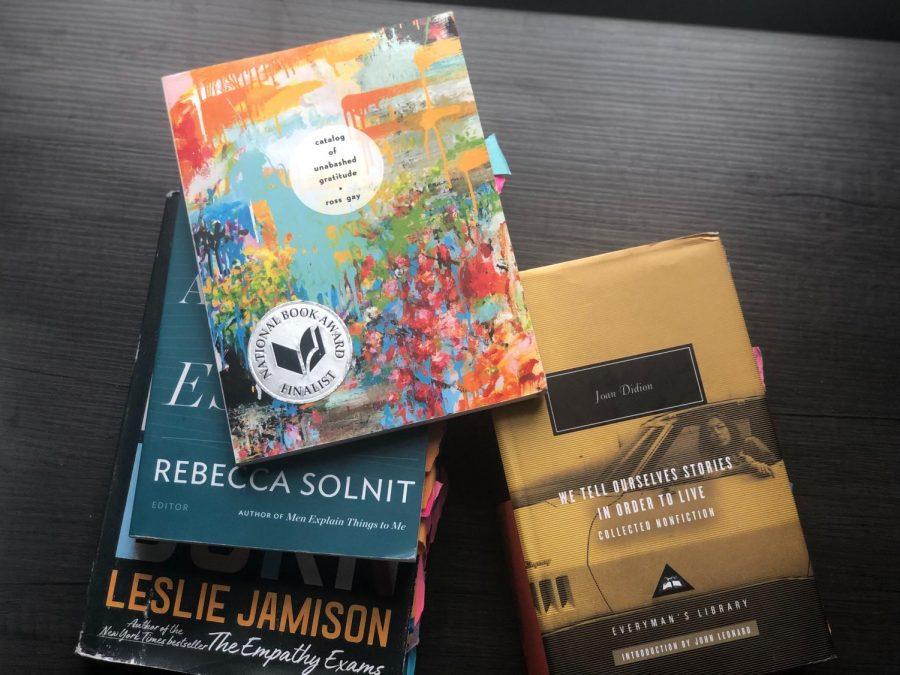Books I’m reading in the time of COVID-19
Leah Mensch | Contributing Editor
Isolation is the perfect reason to read.
March 30, 2020
As it has been for most everyone, this time of uncertainty, for me, is full of fear and a desire to escape through literature. And so, alas, The Pitt News’s self-proclaimed book critic has come out of the woodwork — but still six feet away from everyone else, don’t worry. From classics to new releases, from poetry to fiction to essay and memoir, these are a few reads that have been keeping me sane in the time of COVID-19.
“Harry Potter” series, J.K. Rowling
Yes, it’s a children’s series, but there’s no law in place saying adults can’t enjoy children’s books. And to be frank, if there is some kind of law in place that I don’t know about, then I’ve already broken it, and that’s fine by me. Whether it’s your first time reading the series — I’m not mad, I’m just disappointed if it is — or your 10th, these books are a way to escape.
And here’s what I keep saying to myself — if Harry Potter can survive all the calamities that come his way in the series, we can get through this pandemic.
“The Plague,” Albert Camus
My friend suggested reading this for a virtual book club as a joke, but then one of my professors mentioned that she’s actually finding a lot of solace in Camus’ early work. So alas, I pulled the book off of my shelf, which I haven’t touched since high school, and I found that my professor was right. The story is based in a fictional town, where a plague breaks out and prompts a mild, prolonged hysteria. Essentially, the book focuses on taking life by the day and embracing the unknown.
“I have no idea what’s awaiting me, or what will happen when this all ends,” Camus writes. “For the moment I know this: there are sick people and they need curing.”
Strangely, it hasn’t felt like a demoralizing read at all.
“Catalog of Unabashed Gratitude,” Ross Gay
Reading Ross Gay is like eating an ice cream cone. You simply cannot be sad while eating an ice cream cone.
Ross Gay’s perpetual subjects are delight and gratitude, and that’s exactly what this poetry collection is full of. Whether it be a poem about a shovel or his mother or the way he buttons his shirt, the energy and enthusiasm with which he writes is contagious. And to me, it’s served as a reminder that I can still find a lot of beauty in ordinary things, like the birds sitting in the trees chirping and the daisies beginning to grow on the side of my favorite walking trail.
“Eleanor Oliphant is Completely Fine,” Gail Honeyman
This book is a light, sweet read that always makes me feel happy, even in trying times. Eleanor, the protagonist, has no idea how to behave in social situations. Then she becomes friends with the “unhygienic” IT guy at work, and the two of them end up saving an old gentleman who’s fallen on the sidewalk. The three of them all become friends and, ironically for the time, help each other through lives of isolation. It’s a funny and sweet reminder of what just talking to a friend can do. Even if, right now, it’s over Zoom.
“The White Album,” Joan Didion
“We tell ourselves stories in order to live,” is how this piece of Didion’s early work famously begins. But then, Didion goes on to explain that the stories we tell ourselves aren’t real. Essentially, this is a book about trying to find meaning in pain and suffering by telling stories, but falling flat.
I love Didion’s sentences, but right now, it’s the philosophy in this book in particular that’s giving me a sense of solace. She describes how sometimes, we just have to be afraid, and live through something, and understand that we’ll find a way to go on despite all the hardship.
“Recollections of My Nonexistence: A Memoir,” Rebecca Solnit
Just released on March 10, Rebecca Solnit’s book is the newest on this list. She writes with ferocity and rage about feminism, activism, social change, the climate crisis and just about anything else that falls into such categories. But also, her criticism almost always ends on an empowering and hopeful note. It certainly does in this book, and right now, reading essays and memoir that channel rage about social change has felt good to me. Even if the social criticism is unrelated to the COVID-19 pandemic.
“Since I Became Symptomatic,” Leslie Jamison
This is the only COVID-19 read that’s actually about COVID-19. And it’s not a book either. It’s an essay in the New York Review of Books by one of my favorite writers about living in New York City and falling ill with the coronavirus, all while being a single parent. But really, it’s about loneliness and isolation — it’s different forms.
“Quarantine teaches me what I’ve already been taught, but I’ll never learn — that there are so many other ways to be lonely besides the particular way I am lonely,” Jamison writes.
Still, the essay ends on a hopeful note — something that we all need a bit of right now.









